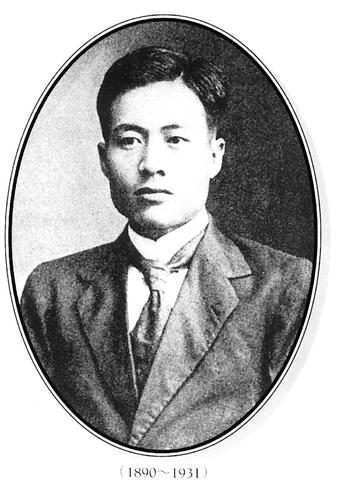Who are the people who established the foundations of Taiwan's modernization at the beginning of the 20th century? Who are the heroes of Taiwan's fight against the Japanese colonial regime? Who are the foreigners who showed more love for this land than many Taiwanese? It is their story that will be told in a TV series titled A Century of Outstanding People in Taiwan (台灣百年人物誌) to air on the Public Television Service (PTS) starting Tuesday.
It took PTS more than two years to produce such a large-scale historical documentary series. It is the first time PTS has chosen to air a documentary series during its prime time 8pm to 9pm, Monday to Friday time slot.
Thirty influential people from the last century are to be featured in the series, with each episode featuring one person's life. The first two episodes feature political movement pioneers Lin Hsien-tang (林獻堂) and Chiang Wei-shui (蔣渭水). In the 1920s, under Japanese rule, the two set up the Taiwan National Council and the Taiwan People's Party respectively, the first political parties to be established in Taiwan. They were the first people who sought to lift the status of Taiwanese during the Japanese occupation period through the creation of democratic political movements.

PHOTO COURTESY OF PTS
Lin also set up the Taiwan Culture Association which brought together Taiwan's cultural and intellectual elite in a forum for the promotion of Taiwanese culture.
Also featured in the series is George Leslie Mackay the first missionary to work in northern Taiwan. His name is still common currency among Taiwanese, associated as it is with the Mackay Memorial Hospitals. Less well known are his contributions to modern education in Taiwan.
For the first time in this type of historical documentary, three Japanese have been included on the honor roll. They include Shimpei Goto, who was the first Japanese governor of Taiwan. It was he who commissioned the first large-scale survey of Taiwan's folk culture. He also established the foundations of Taiwan's modern railway and industry.
Then there is Yoichi Hatta, a Japanese engineer who spent 20 years building the Chiayi-Tainan canal, at the time the largest irrigation project in Asia.
This project transformed the area covered by thecounties of Chiayi and Tainan from barren wilderness to the largest rice provider in Southeast Asia.
Finally there is Kanori Ino, who was the first anthropologist to investigate Taiwan's Aborigines and who wrote the world's first ethnography of Taiwan's Aboriginal people.
A Century of Outstanding People in Taiwan will air on PTS at 8pm on Tuesday.

William Liu (劉家君) moved to Kaohsiung from Nantou to live with his boyfriend Reg Hong (洪嘉佑). “In Nantou, people do not support gay rights at all and never even talk about it. Living here made me optimistic and made me realize how much I can express myself,” Liu tells the Taipei Times. Hong and his friend Cony Hsieh (謝昀希) are both active in several LGBT groups and organizations in Kaohsiung. They were among the people behind the city’s 16th Pride event in November last year, which gathered over 35,000 people. Along with others, they clearly see Kaohsiung as the nexus of LGBT rights.

Jan. 26 to Feb. 1 Nearly 90 years after it was last recorded, the Basay language was taught in a classroom for the first time in September last year. Over the following three months, students learned its sounds along with the customs and folktales of the Ketagalan people, who once spoke it across northern Taiwan. Although each Ketagalan settlement had its own language, Basay functioned as a common trade language. By the late 19th century, it had largely fallen out of daily use as speakers shifted to Hoklo (commonly known as Taiwanese), surviving only in fragments remembered by the elderly. In

Dissident artist Ai Weiwei’s (艾未未) famous return to the People’s Republic of China (PRC) has been overshadowed by the astonishing news of the latest arrests of senior military figures for “corruption,” but it is an interesting piece of news in its own right, though more for what Ai does not understand than for what he does. Ai simply lacks the reflective understanding that the loneliness and isolation he imagines are “European” are simply the joys of life as an expat. That goes both ways: “I love Taiwan!” say many still wet-behind-the-ears expats here, not realizing what they love is being an

In the American west, “it is said, water flows upwards towards money,” wrote Marc Reisner in one of the most compelling books on public policy ever written, Cadillac Desert. As Americans failed to overcome the West’s water scarcity with hard work and private capital, the Federal government came to the rescue. As Reisner describes: “the American West quietly became the first and most durable example of the modern welfare state.” In Taiwan, the money toward which water flows upwards is the high tech industry, particularly the chip powerhouse Taiwan Semiconductor Manufacturing Co (TSMC, 台積電). Typically articles on TSMC’s water demand